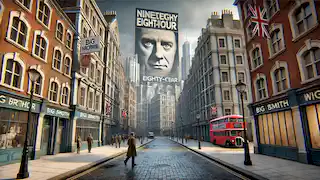Chapter 1: The Beginning
In the year 1984, London was a grim city under the ever-watchful eye of Big Brother. The sprawling metropolis, once known for its rich history and cultural vibrancy, had become a place of oppression and fear. The government, referred to as the Party, controlled every aspect of life, and the leader, Big Brother, was an omnipresent figure whose face appeared on every corner, accompanied by the slogan, "Big Brother is watching you."
The city was divided into three main sections: the Ministry of Truth, the Ministry of Peace, and the Ministry of Love. Each of these ministries had a specific role in maintaining the Party's control over the populace.
Winston Smith, a low-ranking member of the Party, worked at the Ministry of Truth. His job was to alter historical records to fit the Party's ever-changing narrative. Despite the Party's best efforts to suppress individual thought, Winston harbored a deep sense of dissatisfaction and a desire for rebellion.
One dreary afternoon, Winston found himself wandering through the winding streets of London. The sky was a perpetual shade of gray, and the buildings, with their drab, uniform architecture, added to the oppressive atmosphere. As he walked, he couldn't shake the feeling that he was being watched. Paranoia had become a constant companion, a product of living under the Party's iron grip.
Suddenly, Winston noticed a narrow alleyway that he had never seen before. Curiosity got the better of him, and he decided to explore. The alley led to a small antique shop, tucked away from the prying eyes of the telescreens. The shop's owner, an elderly man named Mr. Charrington, greeted Winston warmly.
"Good afternoon, young man. What brings you to my humble shop?" Mr. Charrington asked with a twinkle in his eye.
Winston glanced around the shop, filled with relics from a bygone era. It was a treasure trove of forbidden memories, a stark contrast to the sterile environment the Party enforced.
"I'm not sure," Winston replied, his voice barely above a whisper. "I suppose I was just curious."
Mr. Charrington nodded knowingly. "Curiosity can be a dangerous thing in these times, but it can also lead to discovery."
As Winston browsed the shop, he came across an old leather-bound book. It was a journal, something he had only heard about in whispers. The idea of recording his thoughts was both thrilling and terrifying.
"How much for this?" Winston asked, holding up the journal.
Mr. Charrington smiled. "For you, it's free. But remember, some things are more valuable than money."
Winston left the shop with the journal hidden under his coat, feeling a mix of excitement and trepidation. That night, in the privacy of his small apartment, he began to write. It was a small act of defiance, but it gave him a sense of control over his own mind.
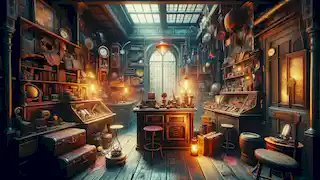
Chapter 2: Julia
Weeks passed, and Winston continued his clandestine journaling. The act of writing his thoughts, unfiltered and honest, became a refuge from the oppressive reality. He knew he had to be careful, as the Thought Police were always on the lookout for any signs of dissent.
One day, at the Ministry of Truth, Winston noticed a young woman named Julia. She worked in the Fiction Department, and though they had never spoken, Winston had often seen her around. Julia was different from the others; she had a spark in her eyes that hinted at something more beneath the surface.
Winston couldn't help but feel drawn to her, but he was also wary. The Party discouraged personal relationships, seeing them as potential threats to its control. Despite his reservations, he found himself thinking about her more and more.
One evening, as Winston was leaving work, he felt a tap on his shoulder. He turned to see Julia standing there, a sly smile on her face.
"Hello, Winston," she said softly. "I need to talk to you. Can we meet somewhere private?"
Winston's heart raced. He knew the risks, but he couldn't resist the opportunity to connect with someone who seemed to share his longing for freedom.
They arranged to meet in a secluded spot in the countryside, far from the prying eyes of the telescreens. The journey was nerve-wracking, but the sense of liberation as they left the city behind was palpable.
In the serene setting of the countryside, Julia and Winston shared their stories. Julia revealed that she, too, harbored rebellious thoughts. She had been involved in several underground activities aimed at undermining the Party.

Chapter 3: The Rebellion
As their relationship blossomed, Winston and Julia became more emboldened in their defiance. They found solace in each other, a rare and precious connection in a world designed to isolate and control.
They began to meet regularly at Mr. Charrington's shop, where they could speak freely and plan their next moves. The antique shop became their sanctuary, a place where they could imagine a future free from the Party's tyranny.
One day, while they were at the shop, Mr. Charrington revealed a hidden room upstairs. It was a place untouched by the Party's surveillance, a relic of a time when privacy was still a right.
"This room is yours, as long as you need it," Mr. Charrington said, his voice tinged with sadness. "Use it wisely."
The hidden room became their haven. They spent hours there, talking, dreaming, and plotting their rebellion. The walls were adorned with old photographs and books, remnants of a world that seemed almost mythical.

Winston and Julia knew they couldn't take down the Party on their own, but they were determined to try. They began to recruit others who shared their sentiments, forming a small but dedicated group of rebels.
Their meetings were risky, but the sense of purpose and camaraderie fueled their determination. They knew that every act of defiance, no matter how small, was a step toward freedom.
Chapter 4: Betrayal
Despite their careful planning, the inevitable happened. One evening, as Winston and Julia were leaving the antique shop, they were ambushed by the Thought Police. It was a trap, and they had walked right into it.
Mr. Charrington, the kindly old shopkeeper, was revealed to be an undercover agent of the Thought Police. His betrayal cut deep, but there was no time to dwell on it as they were dragged away.
Winston and Julia were taken to the Ministry of Love, the most feared of all the ministries. It was a place of torture and re-education, where the Party broke the spirits of those who dared to defy it.
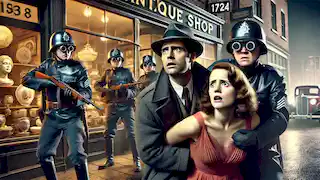
Days turned into weeks, and the relentless interrogations took their toll on Winston. The Party's methods were brutal and effective, designed to strip away any semblance of individuality and resistance.
In the depths of despair, Winston was forced to confront his deepest fears. The Party's ultimate goal was not just to control actions, but to control thoughts. Under the intense pressure, Winston's resolve began to crumble.
Chapter 5: The Fall
Winston was subjected to the horrors of Room 101, a place where the Party used one's worst fears against them. For Winston, it was a cage filled with rats, creatures he had always feared. The psychological torment was unbearable.
In his desperation, Winston betrayed Julia, pleading for the rats to be set upon her instead. It was a moment of ultimate defeat, where the Party's power to break the human spirit was laid bare.
When he was finally released, Winston was a broken man. The spark of rebellion that had once burned brightly within him was extinguished. He returned to his life in the Ministry of Truth, but he was no longer the same.
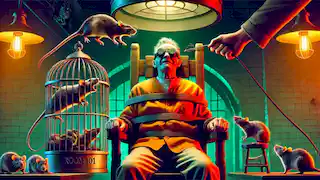
The Party's control over him was complete. Winston's love for Julia had been replaced with a hollow devotion to Big Brother. He had become just another cog in the Party's machinery, his individuality erased.
Chapter 6: Acceptance
In the end, Winston's story was a tragic one. He had dared to dream of a world free from tyranny, but the Party's grip was too strong. His spirit, once rebellious and free, was now subjugated and compliant.
As he sat in the Ministry of Truth, altering records to fit the Party's narrative, Winston realized the futility of resistance. The Party was omnipotent, and any attempt to defy it was doomed to fail.
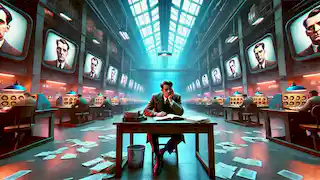
In the end, Winston's acceptance of the Party's control was complete. He had learned to love Big Brother, and in doing so, he had lost himself. The story of Winston Smith was a cautionary tale, a reminder of the dangers of absolute power and the fragility of human freedom.
The gray skies of London continued to loom overhead, a constant reminder of the oppressive regime that governed every aspect of life. The city, once vibrant and full of hope, had become a place of despair and subjugation.
And so, the story of 1984 came to a close, a chilling vision of a world where individuality was crushed, and the human spirit was bent to the will of an all-powerful regime. It was a world where the past was constantly rewritten, and the future was a bleak and unchanging horizon.
